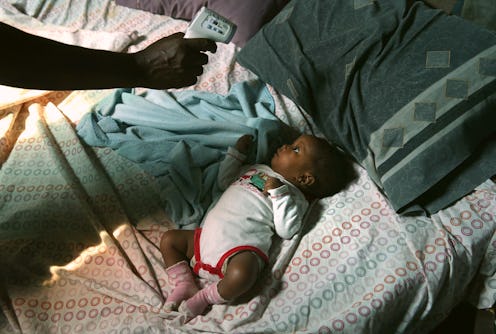News
Human Trials For An Ebola Vaccine Starts This Week

If you asked me what the scariest virus in the world was, I'd probably say Ebola. With the West African outbreak still raging over six months from the first recorded infection, the crisis seems to be worsening and deepening with each passing week. Tom Frieden, director of the Centers for Disease Control, said Tuesday that Ebola is "spiraling out of control." But, take heart, because some good news is on the horizon — human trials for an Ebola vaccine start this week, and a successful result could crucially alter humanity's vulnerability to the highly lethal virus.
The new vaccine was developed by British pharmaceutical company GlaxoSmithKline and the National Institute of Allergy and Infectious Diseases. The trials — which were given an expedited green-light by the FDA, given the severity and urgency of the outbreak — will start off cautiously, with just three healthy adults receiving the vaccine. If those three receive it without adverse side-effects, then the pool of participants will open up to a slightly larger pool of adults between ages 18 and 50.
Basically, they're going to exercise as much caution as you'd expect, while also trying to figure out if this vaccine will work as efficiently as they're able. It's hard to fast-track something through a process as sensitive as human trials, but they're taking unique measures.
The goal, as with any vaccine, is to prevent risk of infection outright by provoking an immune system response that prepares the body to stave off the infection. In the case of this vaccine, there's at least some early cause for hope based on preliminary trials performed on chimpanzees — it reportedly did well, according to NIAID director Dr. Anthony Fauci, who spoke to CNN. He made it clear, however, that that's no guarantee of immediate success when the vaccine is given to humans.
I have been fooled enough in my many years of experience... you really can't predict what you will see [in humans].
Are They At Risk Of Ebola?
Fauci also told CNN that the way the vaccine provokes the immune system won't pose any risk of somebody actually coming down with Ebola themselves, which is important to point out. Anti-vaccination hysteria is something of a cottage industry in the United States these days, and a very dangerous one at that. With this public health crisis in West Africa as dire as it is, it's no time for confusion or misinformation.
Of course, presuming the vaccine trials are successful — and that's still a big presumption at this point — the question of who exactly will receive the treatment looms large. Thanks to international funding, GlaxoSmithKline will be manufacturing 10,000 doses of the vaccine concurrent with the trials taking place, a big risk considering the results won't be set in stone, but it's an aggressive response in the hopes of turning the tide.
Who Would Get The Vaccine?
If the trials are successful, and those vaccines make their way to West Africa, it won't be the largely impoverished and at-risk citizens of the afflicted countries who get them. Rather, Fauci told CNN, health and lab workers would be the first in line before people in Ebola-stricken regions will be considered. Which means this news, however positive, could be cold comfort to thousands of people living in fear in West Africa.
GlaxoSmithKline has been working on the Ebola vaccine since 2013, having acquired a Swiss pharmaceutical company that had started work on finding an Ebola solution back in 2011. Early data from the trials will reportedly be available by late this year.
Images: Getty Images, Flickr/NIAID